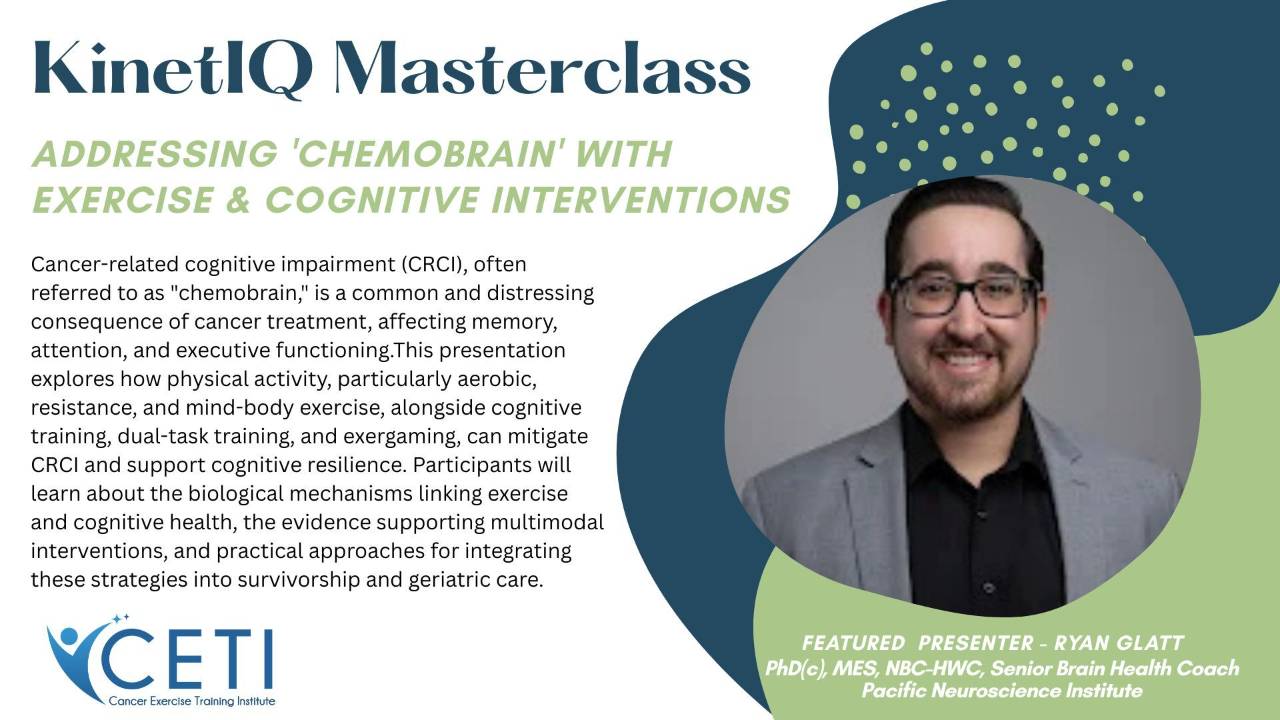
FREE KinetIQ Academy Session - Addressing 'Chemobrain' with Exercise & Cognitive Interventions
May 13, 2025Featuring Brain Health Coach & Neuroscience Expert, Ryan Glatt
Cancer survivors often face more than just physical recovery—many experience lingering cognitive challenges often referred to as “chemobrain.” Memory lapses, trouble focusing, and mental fog are common yet frustrating side effects of cancer treatment. But what if we told you that movement and the right mental strategies could help?
KinetIQ Academy is excited to present an exclusive FREE online session with Ryan Glatt, a leading brain health coach, cognitive health specialist, and advocate for integrative interventions.
While advancements in cancer treatment have dramatically improved survival rates, the long-term effects of treatment—especially on cognitive function—are often overlooked. One of the most distressing and poorly understood consequences reported by cancer survivors is a phenomenon commonly referred to as “chemobrain.”
What is “Chemobrain”?
“Chemobrain” or cancer-related cognitive impairment (CRCI) describes a range of cognitive symptoms experienced during and after cancer treatment. These may include:
-
Memory lapses
-
Difficulty concentrating
-
Mental fog or slower processing speed
-
Trouble multitasking or planning
-
Increased mental fatigue
These symptoms are not psychosomatic or simply "in your head"—they have biological and neurological underpinnings tied to chemotherapy, radiation, hormone therapies, and the emotional stress of a cancer diagnosis. Unfortunately, traditional treatment and rehab settings often do not provide tools or guidance for managing these lasting effects.
The Gap in Current Care
Despite its prevalence, chemobrain is under-recognized and under-treated. Patients are often told it will pass with time, with little to no follow-up. Meanwhile, these cognitive challenges can have a significant impact on:
-
Return to work or school
-
Relationships and caregiving roles
-
Independence and quality of life
-
Mental health (increased risk of depression and anxiety)
As health, wellness, and rehabilitation professionals, we have a responsibility—and an opportunity—to bridge this gap.
The Role of Exercise & Cognitive Interventions
Emerging research shows that structured physical activity and cognitive stimulation can help reduce the symptoms of chemobrain and support neuroplasticity—the brain's ability to adapt and heal. Here's how:
✅ Exercise:
-
Improves blood flow to the brain, enhancing oxygen and nutrient delivery
-
Boosts neurotrophic factors like BDNF (Brain-Derived Neurotrophic Factor), critical for learning and memory
-
Reduces inflammation and fatigue, common side effects of treatment
-
Enhances mood and sleep, indirectly supporting cognitive recovery
✅ Cognitive Interventions:
-
Target specific deficits through mental training and task progression
-
Promote attention, memory, and executive function
-
Help survivors build confidence in their cognitive abilities
-
Provide measurable outcomes for rehab and coaching professionals
Why Professionals Need This Training
Whether you're a personal trainer, physiotherapist, oncologist, nurse, health coach, or counselor, understanding how to safely and effectively integrate cognitive and physical strategies into your work is essential.
This education helps professionals:
-
Tailor interventions to cancer survivors’ unique needs
-
Recognize the neurological and psychosocial dimensions of recovery
-
Deliver evidence-based care that aligns with survivorship goals
-
Foster hope and empowerment in a population often left behind in rehabilitation discourse
Empowering Survivors with Science
By learning how to support cognitive recovery through exercise and brain-based interventions, we give survivors more than tools—we give them agency, resilience, and the possibility of thriving after cancer.
This is not just professional development—it's life-changing education for both providers and the people they serve.
What You’ll Learn:
In this live, interactive session, Ryan will dive into:
-
What “chemobrain” really is and why it affects so many cancer survivors
-
The role of neuroplasticity in cognitive recovery
-
Evidence-based exercise strategies to support brain health
-
Cognitive training tools to improve memory, focus, and mental clarity
-
How to integrate movement and brain-training into real-world routines
Whether you're a cancer survivor, healthcare provider, caregiver, or fitness professional, this session will equip you with practical tools to support cognitive health in the wake of cancer treatment.
📅 Date: July 23, 2025
🕐 Time: 9-9:30 a.m. Pacific
💻 Location: Zoom Session - Register for Free HERE
Ryan Glatt is a seasoned health and fitness professional with over a decade of experience, specializing in the intersection of neuroscience, exercise, and cognitive health. As a Certified Personal Trainer and National Board-Certified Health & Wellness Coach, Ryan has dedicated his career to developing personalized, evidence-based interventions aimed at enhancing brain function and overall well-being.
Currently serving as the Director of the FitBrain® Program at the Pacific Neuroscience Institute in Santa Monica, California, Ryan collaborates with clinicians and researchers to design and implement cognitive-motor training protocols. His work focuses on individuals with neurological conditions such as mild cognitive impairment, dementia, Parkinson's disease, multiple sclerosis, and those experiencing cognitive concerns post-cancer treatment.
Ryan's academic credentials include a Master's degree in Applied Neuroscience from King's College London and a Bachelor's degree in Exercise Science from California Lutheran University. He is presently pursuing a Ph.D. in Health & Human Performance, with a minor in Gerontology, at Concordia University Chicago. His educational journey is complemented by specialized training from institutions like the Amen Clinics, The BrainFirst Training Institute, the Neuroscience Academy, and the Academy for Brain Health & Performance.
A pioneer in the field of cognitive health, Ryan developed the Brain Health Trainer course—the first comprehensive program integrating brain health and exercise—distributed by the American Council on Exercise (ACE). He is also an advocate for "serious exergaming," utilizing technology-driven, goal-oriented games that combine physical movement with cognitive challenges to promote neuroplasticity and functional improvement.
Beyond his clinical and educational endeavors, Ryan consults for technology companies in the realms of virtual reality, gamified rehabilitation, and dual-task training, aiming to create scalable solutions for cognitive enhancement. His commitment to advancing brain health through innovative, integrative approaches makes him a sought-after expert in both academic and professional circles.
Register for Ryan's Free Session HERE
Start your journey to becoming an OncoVie™ Cancer Exercise Specialist with our world-leading courses in oncology exercise.

